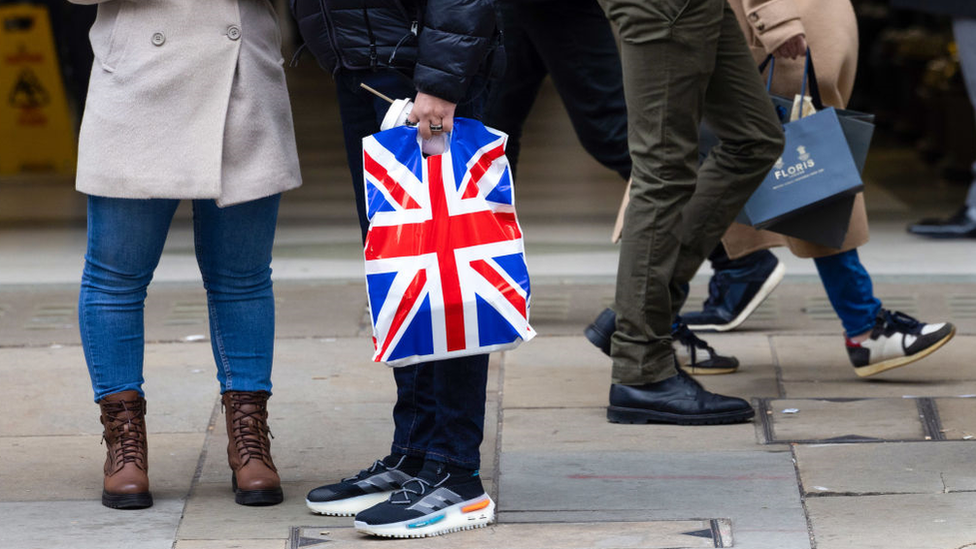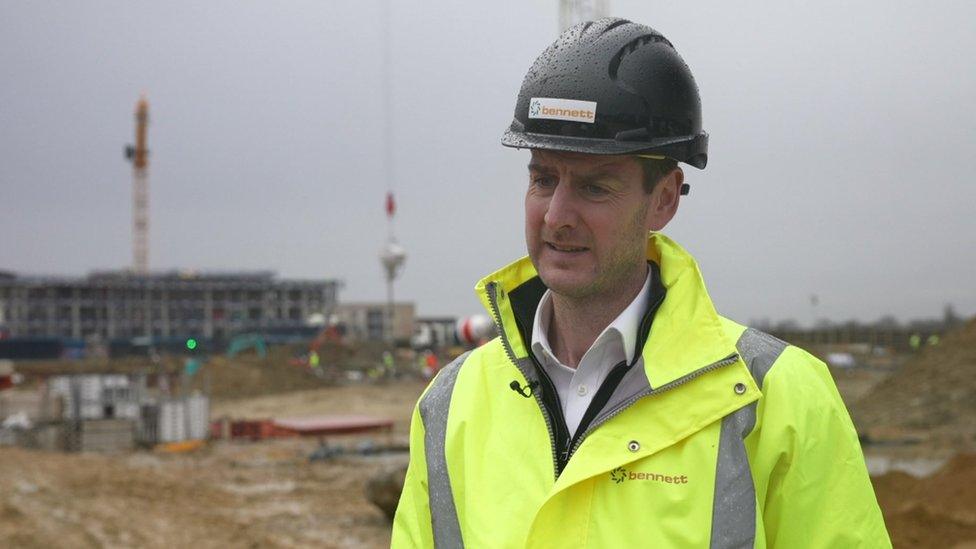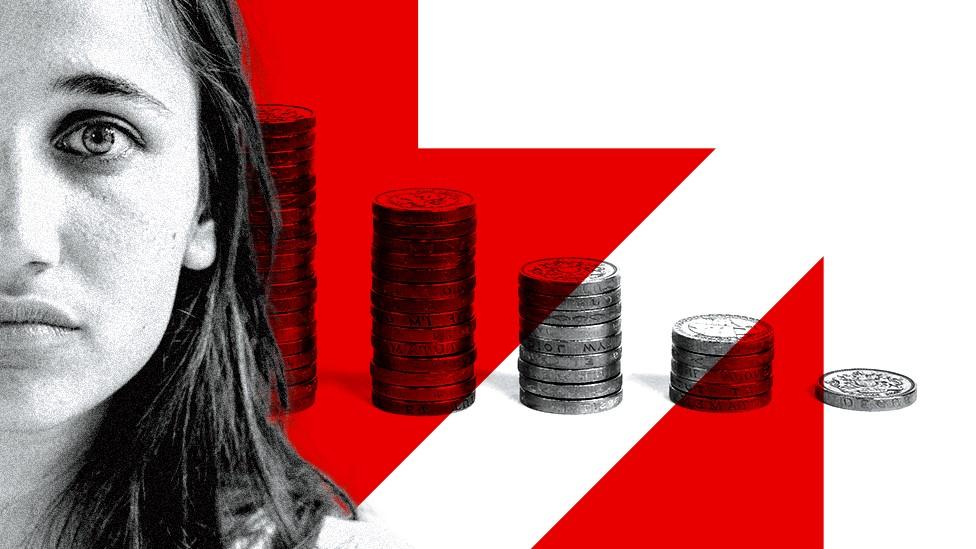UK economy fell into recession after people cut spending
- Published
- comments

People spending less, doctors' strikes and a fall in school attendance dragged the UK into recession at the end of last year, official figures show.
The economy shrank by a larger than expected 0.3% between October and December, after it had already contracted between July and September.
The UK is in recession if it fails to grow for two successive quarters.
The figures raise questions over whether Rishi Sunak has met his pledge made last January to grow the economy., external
The government has never publicly said what measure should be used to assess if it had met the Prime Minister's pledge, despite repeated requests.
In some private briefings to journalists, sources said it would be if the economy was bigger between October and December compared to the previous three months.
But based on that measure, Mr Sunak's promise has not been fulfilled because the UK economy shrank by 0.1% in July to September.
For the whole of 2023, the UK economy grew by 0.1%.
Nevertheless, excluding the Covid years, that annual growth figure is the weakest since 2009 when the UK and other major economies were reeling from the global financial crisis when bank lending almost ground to a halt.
Shadow chancellor Rachel Reeves said the latest figures showed that Mr Sunak's pledge to grow the economy was "in tatters".
The UK is not alone in facing economic pressure. The European Union narrowly avoided recession in the second half of 2023 while Japan confirmed its economy had contracted for a second quarter.
The Office for National Statistics (ONS) said there were a number of areas where economy faltered at the end of the year. Shoppers spent less in December after taking advantage of Black Friday sales in November.
The health sector was affected by strike action by junior doctors while attendance levels at schools dropped by 1%.
Gross domestic product (GDP) is a key measure of all the economic activity of companies, the government, the public sector and individuals in a country.
The government can use growing GDP as evidence that it is doing a good job of managing the economy. Likewise, if GDP falls, opposition politicians can suggest the government is running it badly.
If GDP is going up steadily, people pay more in tax because they're earning and spending more. This means more money for the government that it can choose to spend on public services, such as schools, police and hospitals.
Governments also like to keep an eye on how much they are borrowing in relation to the size of the economy.
Treasury sources have confirmed to BBC News that Chancellor Jeremy Hunt is looking at a larger squeeze on public spending as a way to deliver tax cuts in the Budget on 6 March.
Forecasts for the public finances have materially deteriorated in recent weeks as interest costs on UK government borrowing have increased. Final decisions on the Budget have not been made.
Commenting on whether or not Mr Sunak had fulfilled his pledge to grow the economy, Mr Hunt told the BBC: "When the Prime Minister made his commitment he was very clear, tackling inflation had to come first.
"The big picture is that actually since then the economy has been more resilient, unemployment has stayed low, real wages have been rising now for six months. And if we stick to our guns now, we can see light at the end of the tunnel."
Figures earlier this week showed wage growth had slowed, but was still outpacing price rises. Meanwhile, inflation - the rate at which prices rise - was lower than expected in January with monthly food prices falling for the first time in over two years. However, it is still double the Bank of England's 2% target.
'Mild recession'
Ruth Gregory, deputy chief UK economist at Capital Economics, said "this recession is as mild as they come", adding that the data "is more politically significant than it is economically".
However, Lord Rose, chairman of Asda, the supermarket group, told BBC Radio 4's Today programme: "It looks like a duck, it quacks like a duck, it walks like a duck, it is a duck - it is a recession.
"There is no surprise here and I take no pleasure in saying there is no surprise that we're in it. We've got a low growth economy or a no growth economy."
Official figures from the ONS showed that during the final three months of last year, there was a slowdown in all the main sectors it measures to determine the health of the UK economy, including construction and manufacturing.
Mark Keyes, construction director at building firm Bennett, said last year had been "turbulent".
"We were still feeling the ripple effects of inflation running through the industry, and then that was, in a way, compounded with rising interest rates," he said.

Last year was "turbulent", according to Mark Keyes, construction director at building firm Bennett
The Bank of England had been lifting interest rates to put the brakes on inflation but has kept them at 5.25% since August last year.
Mr Hunt said: "While interest rates are high - so the Bank of England can bring inflation down - low growth is not a surprise."
But he said he believed the economy was "turning a corner", while Mr Keyes said there were signs of optimism in the construction industry.
"I suppose you look at the start of the year compared to the start of last year, there definitely is an uptake in inquiries," said. "I suppose the air of optimism is there, albeit a glimmer of light at the end of the tunnel."

BBC News is keen to hear what questions you have on recession and the economy.
You can get in touch by using the form below or by emailing YourQuestions@bbc.co.uk, external.
If you are reading this page and can't see the form you will need to visit the mobile version of the BBC website to submit your question or send them via email to YourQuestions@bbc.co.uk, external. Please include your name, age and location with any question you send in.
In some cases, your question will be published, displaying your name, age and location as you provide it, unless you state otherwise. Your contact details will never be published. Please ensure you have read our terms & conditions and privacy policy.
Related topics
- Published10 May 2024

